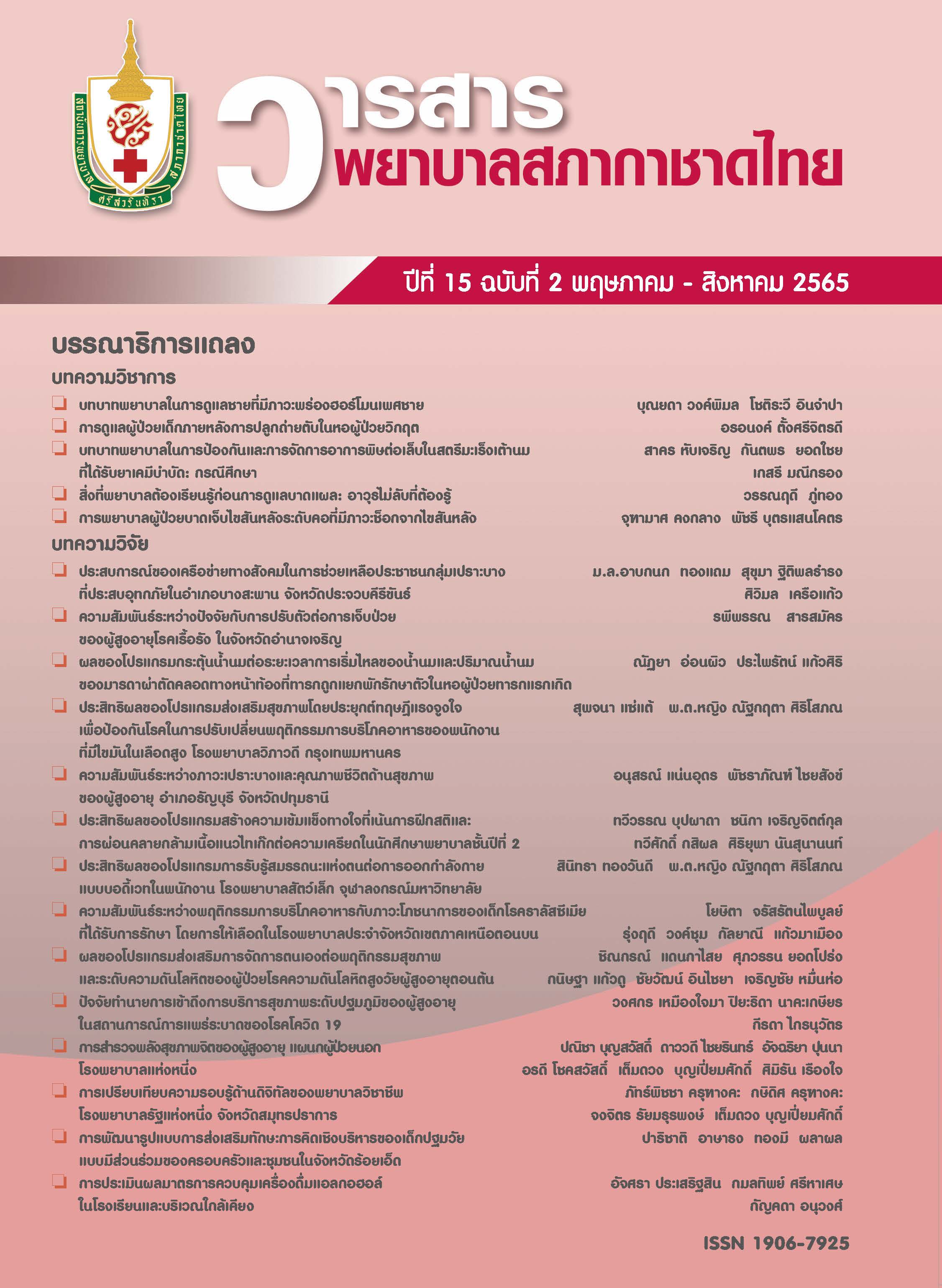The Comparison of the Digital Literacy of Registered Nurses in a Government Hospital in Samutprakan Province
Keywords:
digital literacy, registered nurses, analysisAbstract
Digital literacy is one of the most important competencies for registered nurses. To be able to appropriately and efficiently use digital technology in healthcare is an essential skill for registered nurses. The purposes of this study were to study the level of digital literacy and compare the digital literacy levels classified by the backgrounds of registered nurses. The samples were 260 registered nurses in a government hospital in Samutprakan province. The research instrument was the digital literacy questionnaire. Content validity of the questionnaire was confirmed by three experts, yielding values for each item ranging from 0.67-1.00, and reliability of the questionnaire was tested by Cronbach’s alpha coefficient, yielding a value for each dimension ranging from .946-.979, and a total of .991. Descriptive statistics and three-way analysis of variance were used to analyze the data.
The results showed that registered nurses had a moderate level of digital literacy. The comparison of registered nurses’ digital literacy backgrounds showed that perceptions of digital literacy among nurses of different ages are independent of the frequency of use of digital technology, and training experience or training in the use of digital technology is statistically significant at the .05 level. Compared with each background factor, it was found that the ages and the frequency of use of digital technology of registered nurses had different levels of digital literacy at a statistically significant level of .05. However, at the .05 level, there was no statistically significant difference between the levels of digital literacy based on training experience or training in using digital technology. The information obtained can be utilized to educate and improve registered nurses’ digital literacy.
References
Hani U, Sonhaji S, Anggraini CN. Media digital literacy program in improving parental mediation efficacy with community nursing approach. STRADA Journal Ilmiah Kesehatan 2020;9(2):1779-87. doi.org/10.30994/sjik.v9i2.522
Ministry of Digital Economy and Society. Government action plan Ministry of Digital Economy and Society Fiscal Year 2021. Bangkok: Ministry of Digital Economy and Society; 2021. (in Thai)
Kruse CS, Beane A. Health information technology continues to show positive effect on medical outcomes: systematic review. J Med Internet Res 2018;20(2):e41. doi: 10.2196/jmir.8793.
Skiba DJ. Nursing informatics education: from automation to connected care. Stud Health Technol Inform 2017;232:9-19. https://doi.org/10.3233/978-1-61499-738-2-9.
De Leeuw JA, Woltjer H, Kool RB. Identification of factors influencing the adoption of health information technology by nurses who are digitally lagging: In-depth interview study. J Med Internet Res 2020;22(8):e15630. https://doi.org/10.2196/15630
Brown J, Pope N, Bosco AM, Mason J, Morgan A. Issues affecting nurses’ capability to use digital technology at work: an integrative review. J Clin Nurs 2020;29 (15-16):2801-19. https://doi.org/10.1111/jocn.15321
Law N, Woo D, Wong G. A global framework of reference on digital literacy skills for indicator 4.4.2 [Internet]. Montreal: UNESCO Institute for Statistics; 2018 [cited 2022 Feb 3 ]. Available from: http://uis.unesco.org/sites/default/files/documents/ip51-global-framework-reference-digital-literacy-skills-2018-en.pdf
Rahman T, Amalia A, Aziz Z. From digital literacy to digital intelligence a comparative study of digital literacy frameworks. Proceedings of the 4th International Conference on Sustainable Innovation 2020-Social, Humanity, and Education (ICoSIHESS 2020); 2021 Jan 21; Netherlands: Atlantis Press; 2021. p. 154-9. https://doi.org/10.2991/ assehr.k.210120.11N9
Hughes SA. The digital nurse: experimenting with open sourced multimedia. Research summary for the open university module H818 the networked practitioner [Internet]. 2017 [cited 2022 Feb 3]. Available from: http://oro.open.ac.uk/72144/
Staggers N, Elias BL, Makar E, Alexander GL. The imperative of solving nurses’usability problems with health information technology. J Nurs Adm 2018;48(4):191-6. doi: 10.1097/NNA.0000000000000598.
Khezri H, Abdekhoda M. Assessing nurses’ informatics competency and identifying its related factors. J Res Nurs 2019;24(7):529-38. doi: 10.1177/1744987119839453.
Kleib M, Nagle L. Factors associated with Canadian nurses’ informatics competency. CIN: Computers, Informatics, Nursing 2018;36(8):406-15. doi: 10.1097/ CIN.00000000 00000434
Krejcie RV, Morgan DW. Determining sample size for research activities. Educ Psychol Meas 1970;30(3):607-10. https://doi.org/10.1177/001316447003000308
Aguilera LS, Dickey EK, Guzman K. Using interdisciplinary dress rehearsal events to ensure staff readiness when opening a new healthcare facility. HERD 2020;13(1): 221-33. doi: 10.1177/1937586719861553.
Knippa S, Senecal PA. Using simulation to prepare nursing staff for the move to a new building. Journal for Nurses in Professional Development 2017;33(2):E1-5. https:// doi.org/10.1097/NND.0000000000000329
Health Education England. Improving digital literacy. Leeds: HEE; 2018
Brown J, Morgan A, Mason J, Pope N, Bosco AM. Student nurses’ digital literacy levels: Lessons for curricula. Comput Inform Nurs 2020;38(9):451-8. https://doi. org/10.1097/CIN.0000000000000615
Sharma A, Harrington RA, McClellan MB, Turakhia MP, Eapen ZJ, Steinhubl S, et al. Using digital health technology to better generate evidence and deliver evidence-based care. J Am Coll Cardiol 2018;71(23):2680-90. doi: 10.1016/j.jacc.2018.03.523.
Pholtana S, Hanprom N, et al. Factors related to information and communication technology behaviors of nursing student, Royal Thai Navy College of Nursing. Royal Thai Navy Medical Journal 2017;44(3):19-34. (in Thai)
Jouparinejad S, Foroughameri G, Khajouei R, Farokhzadian J. Improving the infor-matics competency of critical care nurses: results of an interventional study in the southeast of Iran. BMC Med Inform Decis Mak 2020;20(1):220. doi: 10.1186/s12911-020-01244-5
Downloads
Published
Issue
Section
License
Copyright (c) 2022 Srisavarindhira Thai Red Cross Institute of Nursing

This work is licensed under a Creative Commons Attribution-NonCommercial-NoDerivatives 4.0 International License.
เนื้อหาบทความหรือข้อคิดเห็นต่างๆ ในวารสารพยาบาลสภากาชาดไทยนี้ เป็นความคิดเห็นของผู้เขียนบทความ ไม่ใช่ความเห็นของกองบรรณาธิการ หรือสถาบันการพยาบาลศรีสวรินทิรา สภากาชาดไทย






